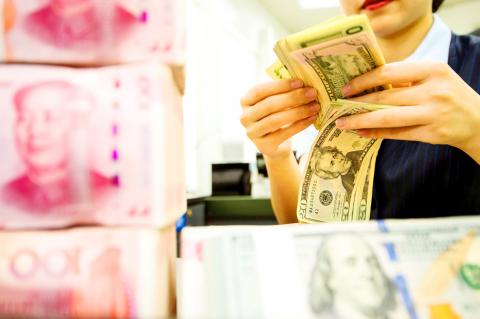US President Donald Trump’s administration on Monday formally labeled China a currency manipulator, further escalating its trade war with Beijing after the People’s Bank of China (PBOC) allowed the yuan to fall in retaliation for new US tariffs.
While the US Department of the Treasury’s determination is largely symbolic, as the potential punishments are a shadow of the steps Trump has already taken against China, it underscores the rapidly deteriorating relationship between the world’s two largest economies.
The US announcement followed a declaration by PBOC Governor Yi Gang (易綱) that China would not use the yuan as a tool to deal with trade disputes.

Photo: AFP
“I am fully confident that the yuan will remain a strong currency in spite of recent fluctuations amid external uncertainties,” Yi said in a statement.
Under the designation, US Secretary of the Treasury Steven Mnuchin “will engage with the International Monetary Fund to eliminate the unfair competitive advantage created by China’s latest actions,” the department said in a statement.
Trump called the yuan’s plunge below the symbolically important level of 7 per US dollar “currency manipulation” in a tweet.
It is the first time that the US labeled a country a manipulator since the 1990s, when China was also the target.
The PBOC called the designation “wayward unilateralism and protectionist,” and said it “seriously undermined international rules.”
The yuan exchange rate “is driven and determined by market forces,” it said in a statement.
Both the onshore and offshore yuan breached the 7.0 level against the US dollar on Monday, which investors see as a key threshold in the Chinese currency’s value, but foreign exchange trading yesterday was calmer, with the onshore yuan weakening 0.08 percent to 7.0512, and the offshore currency strengthening 0.24 percent to 7.0802.
The PBOC yesterday weakened its central parity bank rate to the lowest level in more than 11 years, but by less than many analysts were expecting — suggesting the bank does not want to let the currency move too much.
“A more market-friendly China fix provided the first signal that the PBOC is having a second thought about weaponizing the yuan,” said Stephen Innes, managing partner at VM Markets Pte Ltd Singapore.
“However, the fix is ambiguous enough to keep two-sided interest alive while still conveying a message to US trade hawks that in no uncertain terms will China be a pushover,” he said.
The PBOC yesterday announced that it would sell 30 billion yuan (US$4.2 billion) of bills in Hong Kong on Wednesday next week. The move typically drains liquidity offshore, making it more costly to short the Chinese currency.
The move helped drive the yuan up 0.2 percent.
If there is no progress a year after the designation, China could face possible sanctions, including its firms being prohibited from competition for US government contracts and excluded from getting financing from a US government agency for development projects.

A Chinese aircraft carrier group entered Japan’s economic waters over the weekend, before exiting to conduct drills involving fighter jets, the Japanese Ministry of Defense said yesterday. The Liaoning aircraft carrier, two missile destroyers and one fast combat supply ship sailed about 300km southwest of Japan’s easternmost island of Minamitori on Saturday, a ministry statement said. It was the first time a Chinese aircraft carrier had entered that part of Japan’s exclusive economic zone (EEZ), a ministry spokesman said. “We think the Chinese military is trying to improve its operational capability and ability to conduct operations in distant areas,” the spokesman said. China’s growing

Nine retired generals from Taiwan, Japan and the US have been invited to participate in a tabletop exercise hosted by the Taipei School of Economics and Political Science Foundation tomorrow and Wednesday that simulates a potential Chinese invasion of Taiwan in 2030, the foundation said yesterday. The five retired Taiwanese generals would include retired admiral Lee Hsi-min (李喜明), joined by retired US Navy admiral Michael Mullen and former chief of staff of the Japan Self-Defense Forces general Shigeru Iwasaki, it said. The simulation aims to offer strategic insights into regional security and peace in the Taiwan Strait, it added. Foundation chair Huang Huang-hsiung

PUBLIC WARNING: The two students had been tricked into going to Hong Kong for a ‘high-paying’ job, which sent them to a scam center in Cambodia Police warned the public not to trust job advertisements touting high pay abroad following the return of two college students over the weekend who had been trafficked and forced to work at a cyberscam center in Cambodia. The two victims, surnamed Lee (李), 18, and Lin (林), 19, were interviewed by police after landing in Taiwan on Saturday. Taichung’s Chingshui Police Precinct said in a statement yesterday that the two students are good friends, and Lin had suspended her studies after seeing the ad promising good pay to work in Hong Kong. Lee’s grandfather on Thursday reported to police that Lee had sent

A Chinese ship ran aground in stormy weather in shallow waters off a Philippines-controlled island in the disputed South China Sea, prompting Filipino forces to go on alert, Philippine military officials said yesterday. When Philippine forces assessed that the Chinese fishing vessel appeared to have run aground in the shallows east of Thitu Island (Jhongye Island, 中業島) on Saturday due to bad weather, Philippine military and coast guard personnel deployed to provide help, but later saw that the ship had been extricated, Philippine navy regional spokesperson Ellaine Rose Collado said. No other details were immediately available, including if there were injuries among